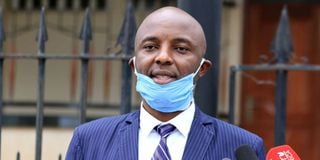Premium
Kang’ata accuses top Jubilee officials of leaking his letter

Senate Majority Chief Whip Irungu Kang’ata.
Embattled Senate Majority Chief Whip Irungu Kang’ata has accused top Jubilee party officials of leaking his letter to President Uhuru Kenyatta over the fate of the Building Bridges Initiative (BBI) in the Mount Kenya region.
In a tweet on Monday night, Mr Kang’ata said that even though he authored the letter dated December 30 airing his views on the status of BBI in Central Kenya region, he did not give it to any media outlet.
“…Though the letter dated 30th December is authentic, I didn't give it to the media. Someone else who had been copied did -- I apologise for that,” Mr Kang’ata wrote.
The letter to President Kenyatta was written through Jubilee Secretary-General Raphael Tuju and copied to Senate Majority Leader Samuel Poghisio, Jubilee Chairman Nelson Dzuya and the party’s National Executive Committee (NEC) members.
The NEC consists of all national officials, including President Kenyatta.
“With the benefit of hindsight, I should have copied no one else. Trust substantive issues raised in the letter will be remedied,” he said in his tweet.
Mr Tuju on Tuesday denied receipt of the letter even as State House remained mum about it.
Mr Tuju told the Nation that he only learnt of the letter through the media and wondered why Mr Kang’ata did not share his views with him or any other party official before taking the step to write to the Head of State directly.
He said that even though party officials have had divergent views on different issues of national interest, such issues are usually addressed through consultations and consensus.
“Whereas I may disagree with that public avenue he took, it is normal that in the leadership of the party whenever we have meetings, we have different opinions being presented on the table,” Mr Tuju said.
He added: “We are not always agreeing on everything and that’s normal because we cannot reach unanimity in each and every subject matter.''
The secretary-general further said: “Once a decision has been made that this is the direction we are taking, then within the principle of collective responsibility, ordinarily we should not disagree in the public domain but take the party line.”
Mr Tuju said Mr Kang’ata erred by writing to the President without any consultations with the party leadership on the subject matter.
State House Spokesperson Kanze Dena, when reached for comment on whether the President had received Mr Kang’ata’s letter, said “no comment.”





